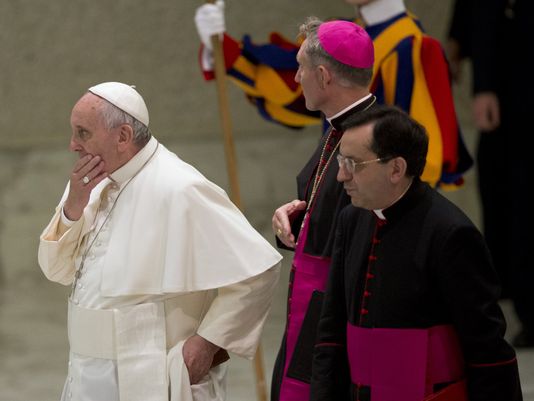Vatican bureaucracy has ‘spiritual Alzheimer’s’

VATICAN CITY (RNS) — Pope Francis launched a blistering attack on the Vatican bureaucracy Monday, outlining a "catalog of illnesses" that plague the church's central administration, including "spiritual Alzheimer's" and gossipy cliques.
The pope's traditional Christmas greeting to the cardinals, bishops and priests who run the Holy See was less an exchange of warm wishes than a laundry list of what the pontiff called the "ailments of the Curia" that he wants to cure.
In a critique that left many of the assembled clerics clearly uncomfortable, the 15 ailments in Francis' "catalog of illnesses" reflected the take-no-prisoners approach he promised when he was elected nearly two years ago as an outsider with little direct experience in Rome.
"The Curia is called upon to improve itself, always improve itself and grow in communion, holiness and knowledge to fully realize its mission," the pope said.
"Yet like every body, like every human body, it is exposed to illnesses, malfunctioning, infirmity. They are illnesses and temptations that weaken our service to God."
In a separate address to Vatican staff later, Francis begged pardon for the "shortcomings" of senior church leaders, as well as the "several scandals" that had "caused so much harm," without specifying which scandals he had in mind.
The pope denounced the lust for power of ladder-climbing clerics, those who indulge in hypocritical double lives, and lamented a sense of "spiritual Alzheimer's" that leads clerics to forget the joy that is supposed to animate their lives.
He also attacked what he called "existential schizophrenia" and the "terrorism of gossip." He was especially critical of cliques that "enslave their members and become a cancer that threatens the harmony of the body," eventually leading to death by "friendly fire."
"These and other maladies and temptations," Francis said, "are a danger for every Christian and for any administrative organization, community, congregation, parish, ecclesial movement, etc., and can strike at both the individual and the corporate level.
Pope suggests no-cost annulments in divorce cases
VATICAN CITY — Pope Francis raised the prospect of no-cost marriage annulments on Wednesday after revealing he had dismissed a church official for selling annulments for thousands of dollars, which he called a "public scandal."
The pontiff made the shocking disclosure as he was addressing canon lawyers at the Vatican for a course on marriage dissolution conducted by the Roman Rota, the church's highest court.
"We have to be careful that the procedure does not become some kind of business," the pope said. "There have been public scandals."
"I had to dismiss a person from a tribunal some time ago who said: 'Give me $10,000 and I'll take care of both the civil and ecclesiastical procedures.' Please, not this!"
Francis did not provide any more details about where or when the sacking occurred. He stressed the need for the church's annulment procedures to be easier, faster and cheaper. He even suggested fees could be waived.
"When you attach economic interests to spiritual interests, it is not about God," he said.
"The mother church has so much generosity it could provide justice free of charge."
Questions surrounding marriage and annulments provoked plenty of debate last month at the Vatican's Synod on the Family as several conservative cardinals resisted moves to open Communion to divorced and remarried Catholics.
Among them was American Cardinal Raymond Burke, an outspoken conservative who heads the Roman Rota. Burke, a former archbishop of St. Louis, has said publicly that he is likely to be demoted soon by Francis.
Annulments are a major issue in the Roman Catholic Church because Catholics who divorce and remarry without seeking an annulment for the previous marriage are prohibited from taking Communion. In the eyes of the church, without an annulment their first marriages are still valid and so they are in effect committing adultery with their new spouse.
Some Catholics complain that the process of obtaining an annulment is arduous, expensive and at times capricious.
Francis spoke about the importance of fairness and accessibility to church tribunals. He said many processes were "so long and so weighty" that many people became "discouraged" and abandoned the process altogether.
The former archbishop of Buenos Aires said some people in his home country of Argentina lived long distances — as much as 150 miles — from a tribunal and so could not afford to take the time from work to go to court to pursue an annulment.
The pope also referred to the commission he established in August to study reform of the canonical matrimonial process and simpler procedures while safeguarding the "indissolubility of marriage."
















